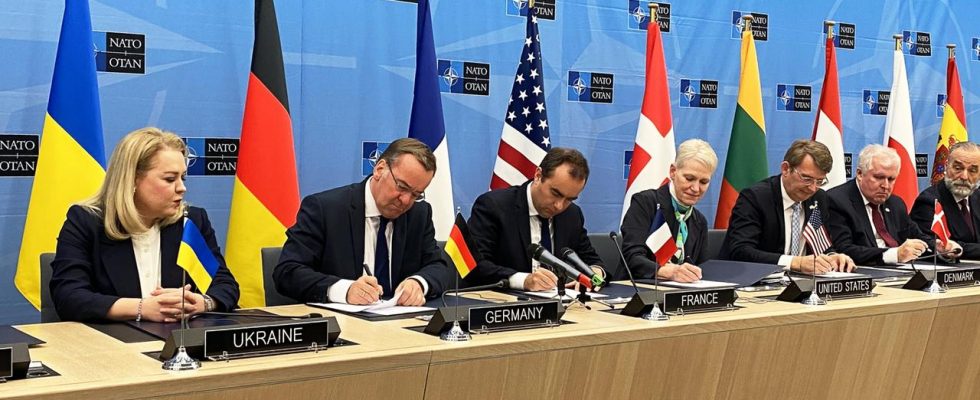NATO defense ministers are discussing aid for Ukraine and their own defense capabilities today. If the USA withdraws from Europe, there will be problems there, particularly in terms of conventional defense.
The Western alliance already has enough problems. Too little ammunition for Ukraine, a deadlocked war with many victims and no prospect of a negotiated solution, the temporary halt to American military aid that is urgently needed in Kiev. “The last thing we need is the nuclear debate,” says Federal Defense Minister Boris Pistorius, explaining in front of the NATO headquarters in Brussels, and with the thrust towards Berlin, that this is a “complex discussion that shouldn’t just be started.”
Coalition partner Christian Lindner from the FDP is likely to be addressed, as is party friend Katarina Barley, the SPD’s top candidate for the European elections, who was open to talking about a European atomic bomb in connection with a European army.
Without US troops, crucial capabilities are missing
The NATO Secretary General also believes that such a new openness to the atomic bomb is completely out of place. If something has worked so far, according to Jens Stoltenberg’s reaction at the defense ministers’ meeting, it was nuclear deterrence. “We shouldn’t undermine their credibility.” Especially since America’s nuclear shield for Europe is pretty much the only thing that has not yet been questioned in the Trump camp’s strategy papers.
From the perspective of political scientist Jana Puglierin, the Europeans are facing a completely different problem; it lies in the area of conventional defense. She sees the danger that the Americans will put their involvement in Europe on hold. The head of the Berlin office of the European Council on Foreign Relations (ECFR) points to “Dormant NATO”, a paper that has made waves in Washington. “The point is that the conventional defense of Europe is guaranteed by the Europeans alone.”
The backbone of Europe’s defense would be broken. American soldiers would be withdrawn from Europe and with them skills such as reconnaissance, air transport, and the rapid deployment of combat troops with large reserves of ammunition. Basically everything that “most European militaries lack,” said Puglierin.
Hardly any coordination Procurement
The deficiency should be remedied with a massive upgrade. During the war in Ukraine, there was an unprecedented increase in defense spending in NATO member states. According to NATO figures, it will be $380 billion in 2024 alone, and almost two thirds of the member countries will then invest at least two percent of their economic power in the military.
But money alone won’t solve it, Puglierin fears. As long as national governments have the ambition to produce their own tanks, submarines and howitzers, cooperation on the battlefield will remain difficult. “The coordination of European procurement is hardly working,” even if national defense budgets have increased. “National reflexes have the upper hand.”
USA expects more Ukraine support from EU
A European tank for everyone – that is still a thing of the future. At the moment there is a big hole that needs to be filled. American Ambassador to NATO Julianne Smith explains that she cannot predict when the US will release $60 billion in military aid to Ukraine. “We know that our friends in Ukraine need immediate help,” she said in an interview with ARD studio Brussels. And makes it clear what America hopes and expects: that this time the Europeans will step in. “I think the support comes from both Germany and the European Union.” So that people in Ukraine can feel on site that the help will continue.
Great expectations. And an unusual situation in NATO. The USA, the strongest military power in the world, is unable to get the promised military aid through Congress. Under the thoroughly transatlantic President Joe Biden. It gives Europeans a taste of what could become permanent if Donald Trump moves into the White House.
Helga Schmidt, ARD Brussels, tagesschau, February 15, 2024 5:22 a.m

